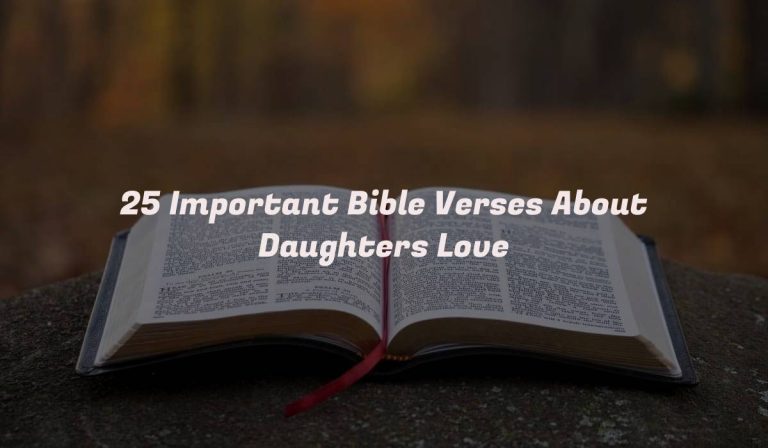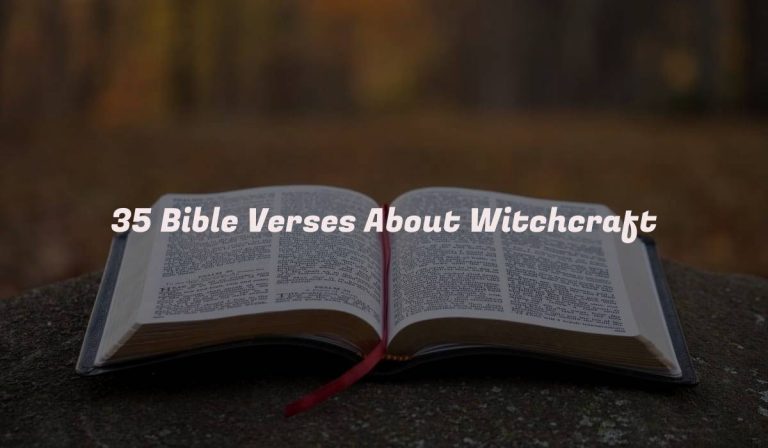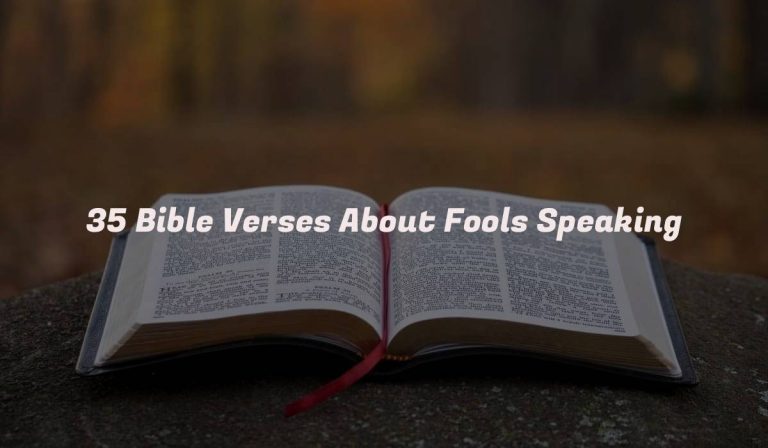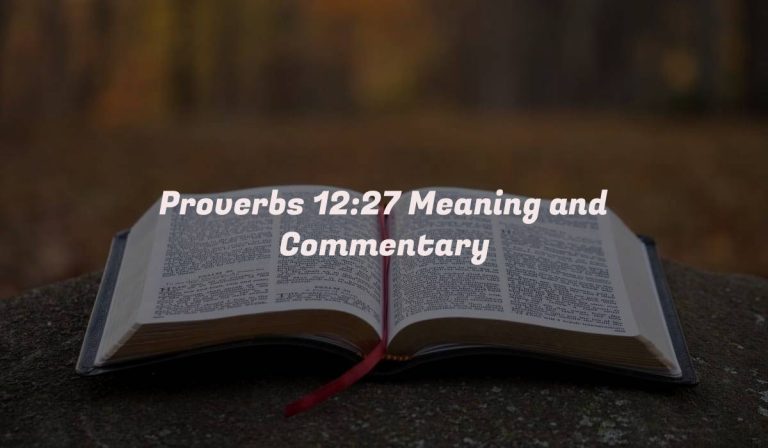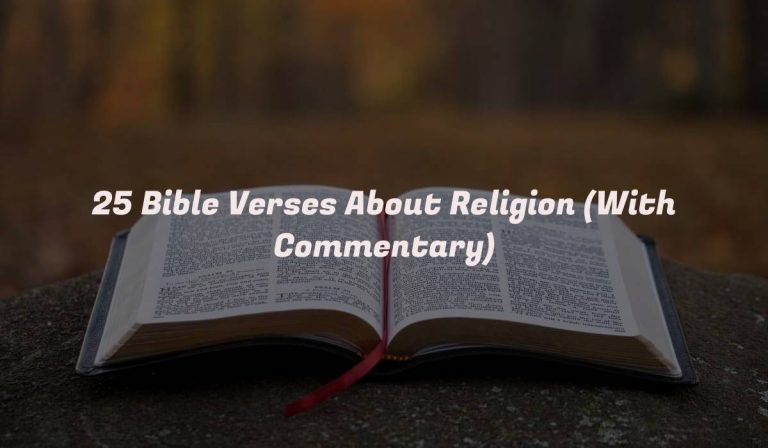What Does The Bible Say About a Ram in the Bush (25 Bible Verses)
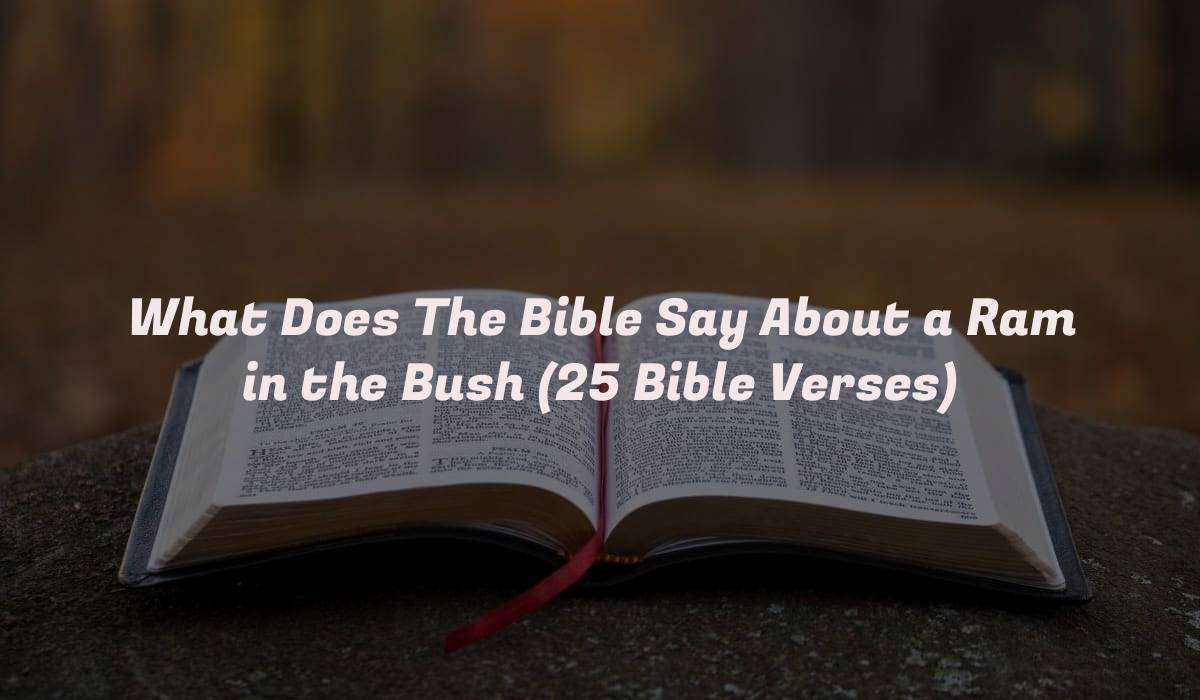
The story of the ram in the bush is a powerful and well-known biblical account. This intriguing event, found in the book of Genesis, holds great significance and offers valuable lessons for believers today. Join me as we uncover the symbolism and messages behind this extraordinary encounter.
Through exploring the related Bible verses, we will gain a deeper understanding of faith, sacrifice, and God’s providence. Get ready to be inspired and enlightened by this timeless story!
Bible Verses About Ram in the Bush
Genesis 22:13
“Then Abraham lifted his eyes and looked, and there behind him was a ram caught in a thicket by its horns.”
In this famous account of Abraham’s willingness to sacrifice his son Isaac, God provided a ram as a substitute offering. The ram was found caught in a thicket, symbolizing God’s divine intervention and provision at the last moment.
Exodus 29:22
“Also you shall take the fat of the ram, the fat tail, the fat that covers the entrails, the fatty lobe attached to the liver, the two kidneys and the fat on them.”
In the context of the consecration of Aaron and his sons as priests, God instructed Moses to take various parts of the ram as offerings. This emphasizes the significance of the ram in Old Testament sacrificial practices.
Leviticus 8:18
“Then he brought the ram as the burnt offering. And Aaron and his sons laid their hands on the head of the ram.”
During the consecration of the priests, a ram was offered as a burnt offering. This act symbolized the transfer of sin and guilt from the priests to the ram, highlighting the role of substitutionary sacrifice.
Numbers 7:15
“One young bull, one ram, and one male lamb in its first year, for a burnt offering.”
In the context of the dedication of the altar, each tribe of Israel was instructed to bring specific offerings, including a ram. This exemplifies the ram’s significance as a regular part of Israel’s worship and sacrifice.
2 Chronicles 29:21
“And they brought seven bulls, seven rams, seven lambs, and seven male goats for a sin offering for the kingdom, the sanctuary, and Judah.”
During the reign of King Hezekiah, a cleansing of the temple took place. As part of the restoration process, seven rams were offered as a sin offering. This symbolized the atonement and the seeking of God’s forgiveness.
Ezra 6:17
“They offered for the dedication of this house of God one hundred bulls, two hundred rams, four hundred lambs, and as a sin offering for all Israel twelve male goats.”
After the rebuilding of the temple in Jerusalem, a grand dedication ceremony occurred. The offering included a significant number of rams, signifying the importance of these animals in worship and devotion.
Job 42:8
“Now therefore, take for yourselves seven bulls and seven rams, go to My servant Job, and offer up for yourselves a burnt offering; and My servant Job shall pray for you.”
At the end of the book of Job, God commanded Job’s friends to offer a burnt offering of seven bulls and seven rams. This act marked the restoration of Job’s fortunes and emphasized the need for sacrifice as part of seeking God’s forgiveness.
Psalm 50:9
“I will not take a bull from your house, nor goats out of your folds.”
In this psalm, the Lord declares His ownership of all creation and emphasizes that He does not require sacrifices for His own benefit. This verse indirectly highlights the alternative use of rams as offerings to seek God’s favor.
Ezekiel 43:23
“When you have finished cleansing, you shall offer a young bull without blemish and a ram from the flock without blemish.”
In the vision of the future temple, God instructed the priests on the offerings and rituals to be carried out. Among them was the offering of a ram from the flock, symbolizing continued obedience and worship.
Hosea 4:16
“For Israel is stubborn like a stubborn calf; now the Lord will let them forage like a lamb in open country.”
In this metaphorical verse, Israel’s stubbornness and unfaithfulness are likened to that of a stubborn calf. The imagery of a lamb foraging in open country suggests vulnerability and a lack of protection or guidance.
Matthew 1:3
“Judah begot Perez and Zerah by Tamar, Perez begot Hezron, and Hezron begot Ram.”
In the genealogy of Jesus Christ, the name “Ram” appears as one of the ancestors of King David. This serves as a reminder of the significance of lineage and the fulfillment of prophecies through the Messiah.
Matthew 26:53
“Or do you think that I cannot now pray to My Father, and He will provide Me with more than twelve legions of angels?”
Jesus, during His arrest in the Garden of Gethsemane, acknowledged His ability to call upon heavenly assistance if necessary. The mention of legions of angels underscores the magnitude of divine power available to Jesus, contrasting with the ram in the bush.
Mark 9:33
“Then He came to Capernaum. And when He was in the house He asked them, ‘What was it you disputed among yourselves on the road?’”
In this passage, Jesus arrives in Capernaum and engages with His disciples. The mention of the house where they gathered signifies a shift in location and sets the context for the conversation that follows.
Luke 10:34
“So he went to him and bandaged his wounds, pouring on oil and wine; and he set him on his own animal, brought him to an inn, and took care of him.”
This verse is part of the parable of the Good Samaritan, where a compassionate Samaritan tends to a wounded man. The mention of an animal indicates the Samaritan’s act of selflessness and care in assisting the injured person.
John 4:50
“Jesus said to him, ‘Go your way; your son lives.’ So the man believed the word that Jesus spoke to him, and he went his way.”
In this account, Jesus heals a nobleman’s son without physically being present. The man displayed faith in Jesus’ words, leading to the miraculous healing of his son.
Acts 8:32
“The place in the Scripture which he read was this: ‘He was led as a sheep to the slaughter; and as a lamb before its shearer is silent, so He opened not His mouth.’”
This verse refers to the prophecy from Isaiah 53:7 concerning the suffering servant, which finds fulfillment in Jesus Christ. The mention of sheep and lambs underscores the sacrificial nature of Christ’s mission on earth.
Romans 8:32
“He who did not spare His own Son, but delivered Him up for us all, how shall He not with Him also freely give us all things?”
In this verse, the apostle Paul highlights God’s ultimate act of sacrificial love by offering His Son, Jesus Christ, for the salvation of humanity. The mention of not sparing His Son emphasizes the immense value and significance of this act.
1 Corinthians 5:7
“Therefore purge out the old leaven, that you may be a new lump, since you truly are unleavened. For indeed Christ, our Passover, was sacrificed for us.”
In this passage, Paul exhorts the Corinthians to cleanse themselves from sin and embrace newness in Christ. The reference to Christ as the Passover sacrifice connects His redemptive work with the deliverance of the Israelites from Egypt.
2 Corinthians 9:15
“Thanks be to God for His indescribable gift!”
Paul expresses gratitude to God for His indescribable gift, which refers to the gift of salvation through Jesus Christ. This verse conveys the immeasurable and incomprehensible nature of God’s grace.
Galatians 4:4
“But when the fullness of the time had come, God sent forth His Son, born of a woman, born under the law.”
Paul emphasizes that Jesus’ birth occurred at the precise moment in history when God’s plan of redemption was ready to unfold. The mention of Jesus being born of a woman highlights His humanity and His submission to the law.
Ephesians 2:13
“But now in Christ Jesus you who once were far off have been brought near by the blood of Christ.”
In this verse, Paul addresses the Gentile believers, highlighting their inclusion in God’s family through the sacrificial blood of Christ. The mention of blood signifies the atonement and reconciliation available through Jesus’ death.
Philippians 2:8
“And being found in appearance as a man, He humbled Himself and became obedient to the point of death, even the death of the cross.”
Paul describes the humility and obedience of Jesus, who willingly submitted Himself to death on the cross. This verse highlights the extent of Jesus’ self-sacrifice for the sake of humanity’s redemption.
Colossians 1:14
“In whom we have redemption through His blood, the forgiveness of sins.”
Paul emphasizes the source of redemption and forgiveness: the shed blood of Jesus Christ. This verse highlights the central role of Christ’s sacrificial act in securing our freedom from sin and its consequences.
1 Timothy 2:5-6
“For there is one God and one Mediator between God and men, the Man Christ Jesus, who gave Himself a ransom for all, to be testified in due time.”
Paul underscores the uniqueness of Jesus as the Mediator between God and humanity. He further emphasizes Jesus’ self-sacrifice, describing it as a ransom given for the salvation of all people.
Hebrews 10:10
“By that will, we have been sanctified through the offering of the body of Jesus Christ once for all.”
The author of Hebrews highlights the effectiveness of Jesus’ sacrifice in sanctifying believers. Through the offering of His body, Jesus achieved complete and lasting sanctification for all who trust in Him.
1 Peter 1:19
“But with the precious blood of Christ, as of a lamb without blemish and without spot.”
Peter refers to the purity and value of Jesus’ sacrifice, likening His blood to that of a spotless and unblemished lamb. This imagery underscores the perfect and uncorrupted nature of Christ’s atoning work.
Revelation 5:12
“Saying with a loud voice: ‘Worthy is the Lamb who was slain to receive power and riches and wisdom, and strength and honor and glory and blessing!’”
In this heavenly scene, the Lamb, representing Jesus Christ, is declared as worthy of honor and praise. The reference to the Lamb being slain highlights the redemptive significance of Jesus’ sacrificial death.


